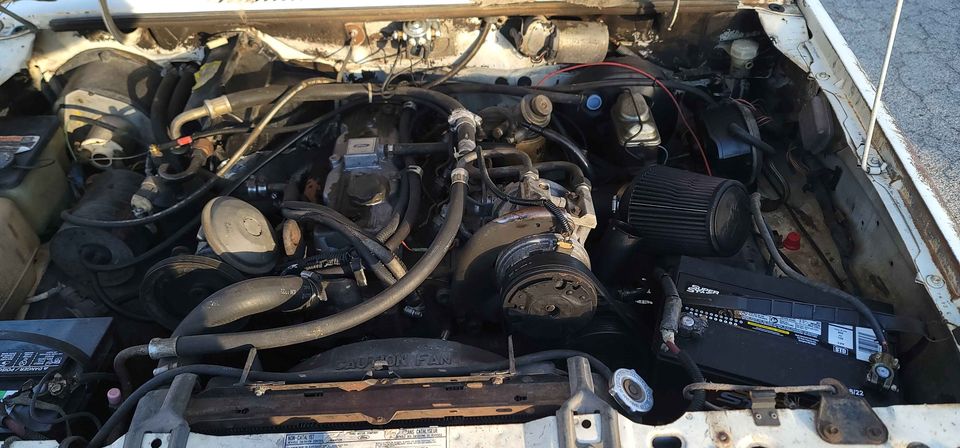Get to Know the Power and Reliability of the 2.2 Ford Ranger Engine for Any Job
Get to Know the Power and Reliability of the 2.2 Ford Ranger Engine for Any Job
Blog Article
What Makes an Automobile Engine Run Efficiently: Top Tips for Ideal Treatment
The smooth procedure of an automobile engine is basic to both efficiency and longevity, making ideal care a crucial responsibility for automobile proprietors. What certain steps should you focus on to guarantee your engine stays in peak condition?
Normal Oil Adjustments
One of the most crucial facets of cars and truck maintenance is guaranteeing your engine gets regular oil adjustments. Engine oil lubes internal components, minimizes friction, and helps keep ideal operating temperatures. Over time, oil degrades as a result of warm, contaminants, and the all-natural by-products of combustion, resulting in reduced performance and potential engine damage.
The majority of makers advise changing the oil every 5,000 to 7,500 miles, however this interval can vary based upon driving conditions and oil kind. Synthetic oils may permit for longer intervals in between changes. Routine oil adjustments not only enhance engine efficiency but likewise boost fuel performance, as clean oil promotes smoother procedure.
Neglecting oil modifications can result in sludge accumulation, which harms circulation and can cause extreme engine issues. It is crucial to examine oil levels routinely and keep an eye on for any kind of unusual modifications in shade or uniformity, which could suggest contamination or deterioration.

Keeping Coolant Levels
Maintaining proper coolant levels is important for stopping engine getting too hot and making sure optimum efficiency. The coolant, commonly a mixture of water and antifreeze, circulates through the engine, absorbing heat and preventing thermal stress. Insufficient coolant can lead to enhanced engine temperatures, which may cause extreme damages or also complete engine failing.
To keep optimum coolant degrees, consistently inspect the coolant reservoir, usually located in the engine bay. Ensure the coolant is filled up to the suggested mark, as indicated in your vehicle's owner guidebook. It is advisable to examine the degrees at the very least when a month or soon trips, especially during severe climate problems.
If you observe that the coolant degree is constantly low, there may be a leakage in the air conditioning system, which ought to be addressed without delay to stop additional complications. 2.2 ford ranger engine. In addition, flushing the coolant system every 2 to 3 years can help get rid of any type of accumulated particles and ensure reliable warm exchange
Monitoring Air Filters

It is recommended to examine the air filter every 12,000 to 15,000 miles, or much more regularly if driving in damaging or dusty conditions. A simple aesthetic inspection can usually expose whether the filter is dirty or harmed. It should be replaced immediately. if the filter appears tarnished or has noticeable dirt you could try these out accumulation.
Making use of a top notch air filter designed for your particular automobile version can even more enhance engine efficiency. Additionally, some vehicles may benefit from recyclable filters that can be cleaned up and re-installed, giving a eco friendly and cost-effective alternative.
Inspecting Spark Plugs
Ignition system are vital elements of a car's ignition system, directly impacting engine efficiency and performance. They produce the spark that ignites the air-fuel mixture in the burning chamber, promoting the engine's power generation. Routine assessment of stimulate plugs is essential for maintaining optimum engine feature and avoiding potential concerns.
During an inspection, seek indicators of wear or damage, such as splits, carbon accumulation, or excessive void widening. A healthy and balanced ignition system typically shows a light brown or tan color. Dark residue or oil deposits can show incorrect burning, while a white or raw look may recommend overheating. Both problems require prompt attention to avoid additional engine damage.
It's suggested to examine trigger plugs every 30,000 miles, or as suggested in your vehicle's owner manual. In addition, consider changing them according to the manufacturer's guidelines, as old or used trigger plugs can lead to misfires, minimized gas effectiveness, and boosted emissions.
Tracking Tire Stress
Guaranteeing correct tire stress is a vital facet of vehicle security and efficiency. Under-inflated tires can lead to lowered gas efficiency, boosted tire wear, and endangered handling. Conversely, over-inflated tires can minimize grip and enhance the danger of blowouts. Consequently, regular monitoring of tire pressure is necessary for optimum vehicle operation.
Tire stress must be inspected a minimum of when a month and soon trips. Utilize a trustworthy tire stress gauge to determine the pressure when the tires are cold, preferably prior to the lorry has actually been driven for at the very least three hours. Refer to the vehicle's proprietor guidebook or the placard situated on the chauffeur's side door jamb for the producer's recommended pressure degrees.
It is essential to keep in mind that tire pressure can vary with changes in temperature; a decline of 10 ° F can lead to a 1-2 psi reduction in pressure. In addition, aesthetically check tires for any signs of wear or damages during your monitoring regimen. Preserving proper tire stress not just enhances lorry safety and security however likewise boosts gas efficiency and prolongs tire life, inevitably adding to a smoother engine performance.
Conclusion
In conclusion, maintaining an auto engine's smooth operation needs diligent interest to numerous key aspects. Ultimately, a proactive technique to engine treatment is essential for making sure reliability and performance over time.
One of the most critical aspects of car maintenance is ensuring your engine receives routine oil modifications. Engine oil lubes inner parts, reduces friction, and helps preserve ideal operating temperature levels. Normal oil adjustments not just boost engine efficiency yet additionally boost gas efficiency, as clean oil advertises smoother procedure.
Not enough coolant can lead to increased engine temperatures, which may his explanation cause severe damage or also complete engine failing.

Report this page